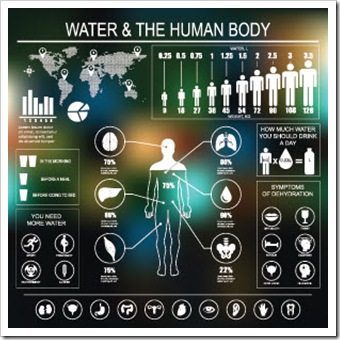
As the temperatures rise, so does our bodies need to cool down. To do this, your body, an incredible machine, has a built-in cooling system that performs the function of sweat. This fabulous machine is also responsible for self-sustaining by making its repairs and, with proper nerve flow, regenerating new healthy cells that make up every organ, tissue fiber, and fluid in our body.
When we get down to it, our bodies contain more water than anything else – about 65-90 percent of our total body weight. This water helps regulate our body’s temperature, transports nutrients, helps remove waste, and helps our spinal discs stay full. Every day, we lose water when we breathe, sweat, urinate, and defecate. Therefore, every day, we must replenish the water not only lost with regular daily activities but as an increased priority when the water is lost by exercise, exerting activities, summer temperatures, and, unfortunately, some poor lifestyle choices, including the consumption of too many caffeinated drinks and/or cigarettes.
So, with water being the dominant factor in our body’s makeup, how important is keeping our bodies hydrated? Critical!
How Much Water Do I Need?
Statistically, the human body can survive three to five weeks without food, three to five days without water, three to five minutes without oxygen, and three to five minutes without nerve supply.
Although water intake would be unique to the activities and lifestyles of the individual, the Institute of Medicine of the National Academy continually reviews research evidence on adequate water intake, and their most recent suggestions for daily intake are as follows:
- Men: 13 cups (about 10.5 cups from beverages)
- Women: 9 cups (about 7 cups from beverages)
- Pregnant women: 10 cups (about 8 cups from beverages)
- Breastfeeding women: 13 cups (about 10.5 cups from beverages)
Am I Hydrated Enough?
Most people can gauge their water intake by simply looking at the color of their urine. When you get enough water, your urine should be a pale yellow, and you should urinate several times daily.
Unfortunately, urine color doesn’t work for everyone. For instance, when taking dietary supplements or certain medications, your urine can vary and even be a bright yellow.
The Equation of Hydration
One big question we are often asked is, “How much water do we need to drink daily?”
Although that is a simple question, it has no easy answer. It depends on some environmental and physical factors that can change every day. An additional factor in the equation is the amount and type of food you eat. On average, 20 percent of your water intake can come from the foods you eat, with the remaining 80 percent coming from non-caffeinated beverages, preferably water.
One of the more straightforward formulas we have found works well is simply drinking fluids daily that equal half of your body weight in ounces. For example, we advise a 200 lb. person to drink 100 ounces of water daily, with the intake of water being small and often rather than huge quantities all at once.
Ready To Help!
Our expert team is ready to help you and your family by recommending various methods to help you get hydrated and stay hydrated to lead your body away from a desert of dysfunction to a water oasis of optimal health and well-being.
For Your Health,
Dr. Steven M. Gillis

